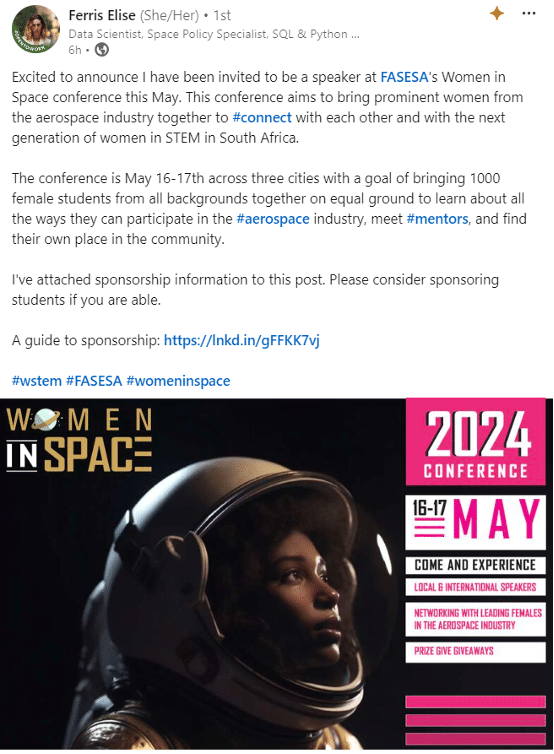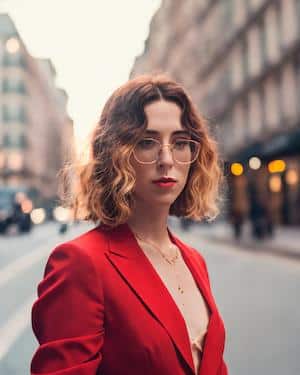By Dr. Kristin Drexler
Faculty Member, School of STEM
with Ferris Elise Mayfield
Graduate Student, School of STEM
Note: This article is the second in a series honoring Women’s History Month.
Happy International Women’s Day! Today is a “global day celebrating the social, economic, cultural, and political achievements of women.” It’s also a day to “celebrate women’s achievement, raise awareness about discrimination, and take action to drive gender parity.”
This week, we continue our Women’s History Month series by highlighting an officer in the University’s student chapter Women in STEM (wSTEM), Ferris Elise Mayfield. Ferris serves as the Secretary for the University’s wSTEM chapter.
I recently had a conversation with Ferris, a current student at the University. She will graduate in May with a master’s degree in space studies and a concentration in astronomy.
Having worked with Ferris since last December, I have been really impressed with her organizational skills, leadership, and her drive to be involved in several extracurricular events and programs. We’re lucky to have her!
Ferris has also been invited to be a speaker at the 2024 Women in Space conference, hosted by the Future African Space Explorer’s STEM Academy (FASESA).

An Interview with Ferris about wSTEM and the Astronomer Who Inspired Her

Dr. Drexler: Ferris, welcome to wSTEM! We’re really happy to have you on the team! What was your interest in joining and leading wSTEM, or why are you passionate about wSTEM?
Ferris: That is a big question for me. Growing up, I watched women around me and myself continuously be told what we could and could not do.
I saw the quiet restraint of older women in my spheres as they said, “Okay, yes, of course,” to the roles pressed on them. As I grew up, though, I was discontented with what I saw and experienced. I did not believe I could have a future where I would feel fulfilled.
In school, I was lucky enough to have some incredible women and men in my life who believed I should not let anyone hold me back. I remember coming alive through science and history in a way only creating music had made me feel before. I was one with the universe. I felt unstoppable.
I saw myself as an answer to my own discontent with life’s expectations and the larger STEM community as the way to make change in the lives of the next generation of women.
I wanted to get involved in leadership, because I feel so strongly that women belong in STEM. We bring balance, curiosity, expertise and creativity to this community.
I also believe STEM has room for all talents and interests and is the key to shaping a better present and future for humanity. I want to see more women leading that mission.
Women belong in STEM. We bring balance, curiosity, expertise and creativity to this community.”– Ferris Elise Mayfield
Dr. Drexler: Who is your biggest wSTEM influence? Do you have a favorite mentor or inspiration?
Ferris: My biggest inspiration is probably Caroline Herschel. This woman was a brilliant astronomer. She discovered many comets and much more.
She also worked with her brothers, who received credit for all of her work for many years. Caroline was far more useful to astronomy than her brothers, if you ask me.
Her life was an uphill battle. As so many other women in STEM have experienced, Caroline was overlooked and had many doors shut in her face simply for being a woman.
She never quit, though. There’s even a medal named after her.
Dr. Drexler: How does Caroline Herschel continue to influence you professionally, academically and personally?
Ferris: The endurance, excellence, and determination of Caroline Herschel is something I reflect upon when I lose motivation or meet obstacles in my path. I am so thankful for her and all the other women before me who fought for my place in this community. She drives me to continue fighting for women in STEM and for myself.
I am so thankful for Caroline Herschel and all the other women before me who fought for my place in this community. She drives me to continue fighting for women in STEM and for myself.” – Ferris Elise Mayfield
Dr. Drexler: What degree are you pursuing at the University, and what would you like to do with your degree?
Ferris: I will graduate this May with a master’s in space studies and a concentration in astronomy. In the future, I hope to use my degree to build a sustainable space economy for future generations. I want to solve the problem of space debris by creating solutions for debris removal, along with decentralized regulation around all activities in space. We need accountability in this new era of commercializing and exploiting space.
It must be driven by us. We cannot wait for government bodies to learn to work together. We must design the mechanisms on our own.
To that end, I am currently working with Jeffrey Ensor at ProblemsSolvedAerospace and have recently joined the core team as Head of Sales at Space Debris DAO. I hope to work with my teams to build these organizations and convert others into the new leaders in my industry.
Dr. Drexler: What would you say to encourage our members to engage more with the larger wSTEM community?
Ferris: Honestly, every ‘break’ I have received so far has come from reaching out to a woman in STEM I admire. I’ve asked for guidance or told them how I think I could help their work with my skills.
Don’t let anything stop you from reaching out for help or to sell yourself. I have connected with so many amazing women in STEM via NASA’s L’SPACE program, LinkedIn, our school chapter of wSTEM and the APUS Analog Research Group.
You have skills people need. No one should intimidate you.
I’m going to steal this saying from a conversation I recently had with Ruby Patterson at Astralytical Space Consulting: ‘You’re Barbie. They’re Ken.’ It may sound silly at first, but truthfully, this is a mindset that has helped me tremendously.
Getting Involved with the University’s Student Organizations
There are several University organizations that are devoted to women in STEM fields, space, or the environment. You can learn more about these organizations at their webpages:
- Women in STEM (wSTEM)
- Association of Women in Science (AWIS)
- APUS Analog Research Group (AARG)
- Supernova Research Group (SRG)
- American Institute of Aeronautics and Astronautics (AIAA)
- National Association of Environmental Professionals (NEAP)
- Students for the Exploration and Development of Space (SEDS)
About the Authors
Dr. Kristin Drexler is a full-time faculty member in the Space Studies and Earth Sciences Department. She teaches geography, environmental science, conservation of natural resources, earth and planetary sciences and sustainability for the School of STEM. She earned her Ph.D. in educational leadership at New Mexico State University with research in socioecological systems, sustainable agroecology, and community education. Her Master of Arts is in international affairs with an emphasis in natural resources management from Ohio University.
Dr. Drexler earned the Undergraduate Excellence in Teaching Award for the School of STEM (2020) and the Dr. Wallace E. Boston Leadership Award (2021). Dr. Drexler has conducted numerous community surveys in Belize and Guatemala regarding agroforestry, conservation, sustainable agriculture, and COVID-19 impacts and is a co-investigator for the multi-year research study, “A Case Study Comparison of Pandemic Experience of Indigenous Groups in the Americas.” In the late 1990s, Drexler served as a Peace Corps volunteer in Belize; she co-founded Full Basket Belize, a 501(c)(3) and has served on its Board of Directors since 2005. Drexler produced the award-winning short film Yochi; she also founded “Science Talks with Dr. Drexler and Friends” to assist teachers during the pandemic. Drexler also co-directs the Gila Film School and has produced seven documentary films sponsored by the US Forest Service to celebrate the centennial of the Gila Wilderness this year. Drexler also serves as a faculty advisor for the University’s wSTEM, AWIS, and SACNAS chapters.
Ferris Elise Mayfield is a current master’s student at the University. She also holds a certificate in applied data science from the Massachusetts Institute of Technology (MIT).
Ferris is also a data scientist, astronomer and space policy expert. Her passion for the aerospace industry is driven by her desire to make life better for all creatures on Earth. As a core member of Space Debris DAO and the co-founder of ProblemsSolvedAerospace, her focus is on solving the problem of space debris and developing a sustainable space economy.
Ferris is also active in the analog research world as a member of The Mars Society and AARG. She is a leader in the wSTEM community at the University, and she is a firm believer in empowering the future generation of STEM leaders.

Comments are closed.